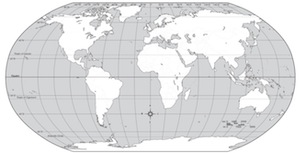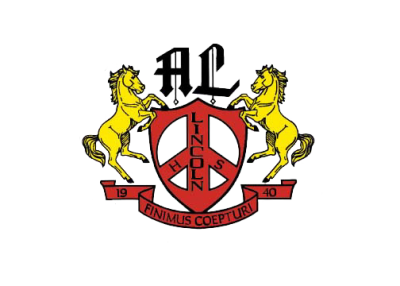The Social Studies Department Link to this section

The social studies courses required for graduation are Modern World History for sophomores, United States History for Juniors, and Economics/American Democracy for Seniors. Additionally, for students wishing to go above and beyond their graduation requirements the social studies department at Lincoln offers the following AP courses; AP World History, AP US History, AP Government and Politics, AP Psychology, and AP Human Geography.
Course Descriptions Link to this section
Modern World History 1 and 2
The course begins by linking the past history to the modern world. The course encompasses events from 1789 to the present. Topics include the roots and rise of Democracy, Revolutions, the Industrial Revolution, Imperialism, World War I, World War II, and the Cold War. Besides focusing on significant historical events, the course is also centered on area studies. Regions are examined as case studies illustrating nationalism in the contemporary world. Students explore content through primary source analysis, geographic study, research, and historical essay writing.
AP World History
AP Modern World is a college level introductory world history course. The course examines the major political, environmental, cultural, economic and social developments that took place in Africa, the Americas, East Asia, South-East Asia, India, Oceana, the Middle East and Europe from 8,000 BCE to the present. The course is organized chronologically, and focuses specifically on identifying changes and continuity within and among civilizations, and making comparisons between civilizations. In addition to content knowledge, students will also develop the necessary skills to read a college level textbook, read and analyze primary and secondary sources, and write analytical essays. Course content and skills are focuses on preparation for the AP exam which takes place in May.
US History
Students in grade eleven study the major turning points in American history in the twentieth century. Following a review of the nation’s beginnings and the impact of the Enlightenment on U.S. democratic ideals, students build upon the tenth grade study of global industrialization to understand the emergence and impact of new technology and a corporate economy, including the social and cultural effects. They trace the change in the ethnic composition of American society; the movement toward equal rights for racial minorities and women; and the role of the United States as a major world power. An emphasis is placed on the expanding role of the federal government and federal courts as well as the continuing tension between the individual and the state. Students consider the major social problems of our time and trace their causes in historical events. They learn that the United States has served as a model for other nations and that the rights and freedoms we enjoy are not accidents, but the results of a defined set of political principles that are not always basic to citizens of other countries.
AP US History
This full year course is designed to provide students with the analytic skills and factual knowledge necessary to deal critically with the problems and materials in U.S. History. This college-level experience will prepare students for the Advanced Placement exam given each year in May. An emphasis is placed on interpreting documents, mastering a significant body of factual information, and writing critical essays. Students will develop the necessary skills to arrive at conclusions on the basis of an informed judgment and to present reasons and evidence clearly and persuasively in essay format.
American Democracy
This course will prepare students to vote, participate in community activities, and assume the responsibilities of citizenship. Students in grade twelve will pursue a deeper understanding of how the American government works. They will compare systems of government in the world today and analyze the history and changing interpretations of the Constitution, the Bill of Rights, and the current state of the legislative, executive, and judiciary branches of government. In addition students will learn about the interaction relationship among federal, state, and local governments, the electoral process and the role of the media in society. Lastly, students will research and debate current issues in American Democracy.
Economics
The study of economics will change the way students think! Students successfully completing this course will apply common economic terms, concepts and reasoning to their everyday lives. This course provides an introduction to basic economic principles of micro- and macroeconomics, international economics and comparative economic systems. Students will master fundamental economic concepts, applying the tools (graphs, statistics, equations) from other subject areas to the understanding of operations and institutions of economic systems. This course also includes a study of current economic issues such as globalization and the environment.
AP Politics and Government
AP Politics and government allows students the opportunity to study their government and the role they play as citizens. This college level course includes both the study of general concepts used to interpret U.S. politics and the analysis of specific examples. A large percentage of time is spent focused on the three branches of government and their roles in our lives. It also requires familiarity with the various institutions, groups, beliefs, and ideas that constitute U.S. politics. Students will study the Constitution to understand their civil liberties and rights. Students completing this course will be empowered to find an active role in politics as well as be prepared for the AP exam.
AP Human Geography
AP Human Geography is much more than the study of maps. This class focuses on the study of human beings, and analyzing the patterns of how we live on this earth. Topics include the study of human populations, culture, race and ethnicity, religion, languages, politics, economics and development, human- environment interactions; (from Neolithic farmers to industrialization), the growth of cities (urbanization), and globalization. This course is a general survey or introductory course in the field of human geography; it is the equivalent of a one-semester entry- level college course. This counts as a G elective for UC/CSU.
This course will open student's eyes to the large and complex world that we live in. It will encourage you to see the world through different lenses, and hopefully will inspire you to travel and explore more for yourself after high school. We take 2-3 field trips a year exploring different areas of San Francisco. There are no prerequisites to take this course, but since it is an elective students must be on track to graduate.
Contact List Link to this section
Department Chair:
Danieul Ruelas
ruelasd@sfusd.edu
Teachers:
Brendan Furey fureyb@sfusd.edu
Nicholas Glasser glassern@sfusd.edu
Jon Ray Guevarra guevarraj2@sfusd.edu
Kevin Grayson graysonk@sfusd.edu
Claire Jensen DarbyC@sfusd.edu
Helen Lee leeh4@sfusd.edu
Victoria Lomeli lomeliv@sfusd.edu
Lisset Madrigal madrigalramirezl@sfusd.edu
Aaron Marestaing marestainga@sfusd.edu
Ingrid Seyer-Ochi seyer-ochii@sfusd.edu
Byron Salata salatab@sfusd.edu
Leon Sultan sultanl@sfusd.edu
Valerie Ziegler zieglerv@sfusd.edu
This page was last updated on October 29, 2025

